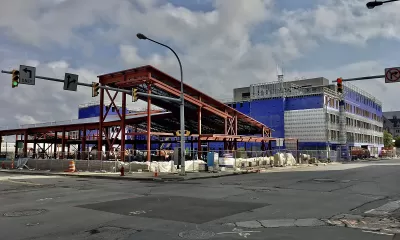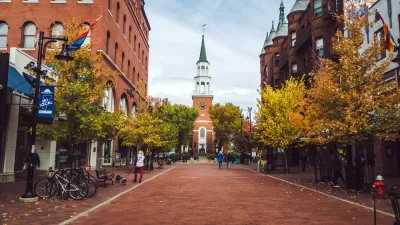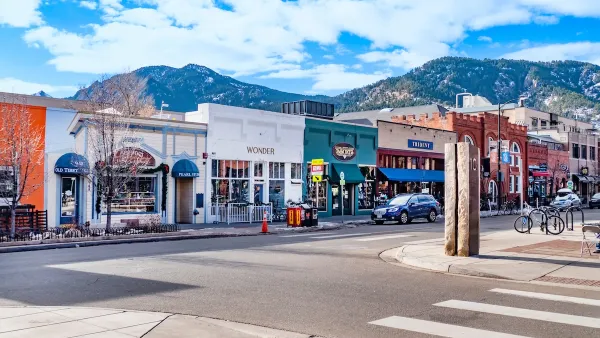The project, which is located near light rail and bus stations, will also include a ride hailing zone, bike parking, and improved pedestrian facilities.

A new housing development in Buffalo will be home to the city's first "mobility hub," designed "to encourage people to walk, bike, take public transit, carshare or any other form of eco-friendly transportation," reports Emily Nanko. "[I]n 2017, Buffalo became the first U.S. city to stop requiring development projects to include a minimum amount of parking. The zoning change also required a 'transportation demand management plan' for new developments over 5,000 square feet."
"A mobility hub made sense not just because residents wanted to prioritize it, but because of the site’s proximity to multiple bus lines and two light rail stations," writes Nanko. "The building design even reflects the needs of the mobility hub. The city expanded the surrounding sidewalks to be more pedestrian friendly and accommodate a 'pull up zone' for ride hailing services. Inside the building there will be secure, long term bicycle parking as well as a fix-it station."
The zoning change seems to have had a significant impact on how developers design their buildings. "A 2021 study analyzing the impact of Buffalo’s 2017 zoning change found that mixed-use developers 'readily took advantage of the newfound possibility to include less off-street parking.' The 14 mixed-use projects tracked provided 53 percent less parking than previously required. Four projects built no parking at all."
FULL STORY: Buffalo’s First Mobility Hub Rolls Forward

Maui's Vacation Rental Debate Turns Ugly
Verbal attacks, misinformation campaigns and fistfights plague a high-stakes debate to convert thousands of vacation rentals into long-term housing.

Planetizen Federal Action Tracker
A weekly monitor of how Trump’s orders and actions are impacting planners and planning in America.

San Francisco Suspends Traffic Calming Amidst Record Deaths
Citing “a challenging fiscal landscape,” the city will cease the program on the heels of 42 traffic deaths, including 24 pedestrians.

Defunct Pittsburgh Power Plant to Become Residential Tower
A decommissioned steam heat plant will be redeveloped into almost 100 affordable housing units.

Trump Prompts Restructuring of Transportation Research Board in “Unprecedented Overreach”
The TRB has eliminated more than half of its committees including those focused on climate, equity, and cities.

Amtrak Rolls Out New Orleans to Alabama “Mardi Gras” Train
The new service will operate morning and evening departures between Mobile and New Orleans.
Urban Design for Planners 1: Software Tools
This six-course series explores essential urban design concepts using open source software and equips planners with the tools they need to participate fully in the urban design process.
Planning for Universal Design
Learn the tools for implementing Universal Design in planning regulations.
Heyer Gruel & Associates PA
JM Goldson LLC
Custer County Colorado
City of Camden Redevelopment Agency
City of Astoria
Transportation Research & Education Center (TREC) at Portland State University
Jefferson Parish Government
Camden Redevelopment Agency
City of Claremont




























